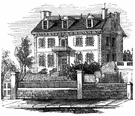John Hancock is perhaps best known for his very large signature on the Declaration of Independence. However, he was much more important to the American Revolution and the Revolutionary War as a businessman who had large sums of money at his disposal and used that money to support the American cause. Like America's other Founding Fathers, however, he started life as a British subject. He was born in Braintree, Mass., in 1737. His circle of friends eventually included John and Samuel Adams.
In 1760, John's uncle, Thomas, was so impressed with his business skills that he sent him to Great Britain on a business mission. While he was there, John witnessed the crowning of King George III. He also made some business contact for his uncle.
Other men who had similarly large amounts of money tended to favor Great Britain and were called Loyalists. Not John Hancock. He had maintained his friendship with John and Sam Adams, the latter of whom was making quite a noise about America cutting free from Great Britain and going it alone. One of Great Britain's responses to its success in what Americans call the French and Indian War was to institute a new series of taxes on the American colonists. America, Great Britain reasoned, was protected by British troops and so should bear much of the burden of repaying the debts racked up during the war. The American colonists, on the other hand, were dismayed that they had no say in whether to approve such taxes.
Next page > The Rest of the Story > Page 1, 2 |
|
Social Studies for Kids
copyright 2002–2026
David White

 John's father died when the boy was young, and John's mother sent her son to live with a rich uncle in Boston. Under his uncle's instruction, John learned the merchant trade and also went to college. He attended Harvard, graduating at age 17, and then became a clerk to his uncle.
John's father died when the boy was young, and John's mother sent her son to live with a rich uncle in Boston. Under his uncle's instruction, John learned the merchant trade and also went to college. He attended Harvard, graduating at age 17, and then became a clerk to his uncle. Just three years later, John's uncle died and left his fortune to his young nephew. Historians differ on how much money this actually was. It is generally believed that young John was one of America's richest men, at age 26.
Just three years later, John's uncle died and left his fortune to his young nephew. Historians differ on how much money this actually was. It is generally believed that young John was one of America's richest men, at age 26. The
The 
